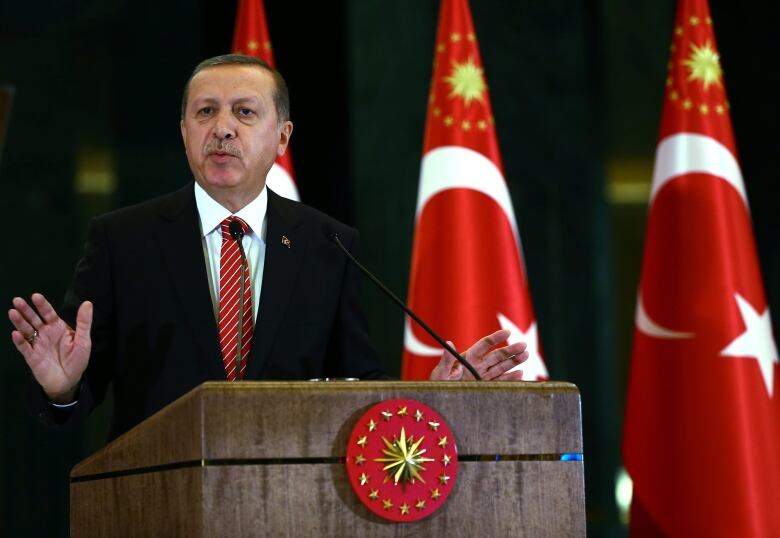Shot-down Russian warplane raises questions on rules of engagement
Potential for 'huge political consequences,' Canadian military expert says, but details of incident unclear
Turkey's decision to shootdown a Russian warplane on Tuesday could have "huge political consequences,' a Canadian military expert says, but some keydetails about the incidentremain unconfirmed.
- VladimirPutinslams Turkey for shooting down Russian warplane near Syrian border
- Trudeau says Canada will help 'de-escalate' tensions between Russia, Turkey
- ANALYSIS: Should we cry or rejoice as Russia steps up in Syria?
"Sometimes immediately after [an incident] accounts differ," saidStfanie von Hlatky, director of the Centre for International and Defence Policy at Queen's University in Kingston, Ont.
Turkey said the Russian Su-24 bomberflying over Syriaignored 10warnings that it was nearing, then intruding, on Turkishairspace. Russia insisted itsplane stayed inSyrian territory.
EveryNATO country, including Turkey, has its own rules of engagement for dealing with airspace violations, von Hlatky said, but standardoperating procedures for Turkey would be similar to those of other countries.
Those operating procedures would dictate that Turkey should first "attempt to open channels of communication with the aircraft" from the ground if it enters a"buffer zone," she said. In this case, the buffer zone would start in Syrian territory about eight kilometres away from the Turkish border.
If the aircraft didn'trespond after several attempts, von Hlatky said, the next step would be to scramble military jetsto try to make contact in the air. That could include sending signals recognized by pilots, she said.
If communication still isn't established with the offending plane, military aircraft wouldtry to"escort" it to the ground essentially forcing it to land.
'Huge political consequences'
When asked if the Russian bombercould have accidentally strayed into Turkish airspace, von Hlatkysaid that military aircraft are equipped with GPS and "they would know where they are."
One of the key questions that needs to be definitively answered, she said, is whether the Russian planewas in the buffer zone or clearly in Turkish airspace something that will likely be determined by radar images in the coming days.
The other critical question is whetherthe Russian plane dropped a bombon Turkmen rebelsfighting against the Bashar al-Assad regime in Syria, as a Turkmen commander has claimed.
Russia is providing air support to Assad. It has also joined the bombing campaignagainst the Islamic State of Iraq and Syria (ISIS) in Syria.
On Tuesday, the Russian military planeappeared to be targetingthe rebels in Syria, not ISIS militants, von Hlatky said.

If Turkey shot down the plane to help the Turkmenrebels in Syria, von Hlatky said, that opens up a"broader dynamic here in the context of a war zone."
Another factor adding to the complexity of the situation, she said, are reports that the Turkmenrebels shot the two Russian pilots after they ejected from the plane and parachuted to the ground.
If that happened,she said, it would be a breach of United Nations laws governingmilitary conflict.
"For sure we need to ask these questions," von Hlatkysaid. "[There are] huge political consequences."
With files from The Associated Press













_(720p).jpg)


 OFFICIAL HD MUSIC VIDEO.jpg)
.jpg)



























































































